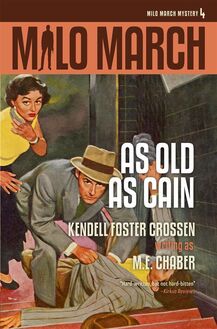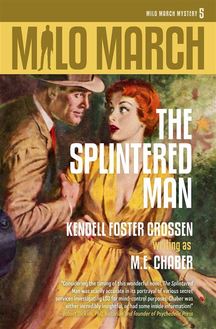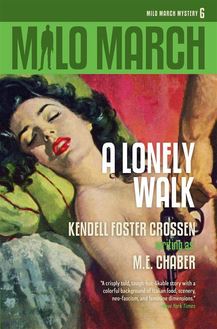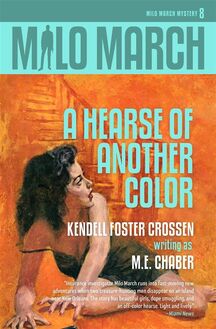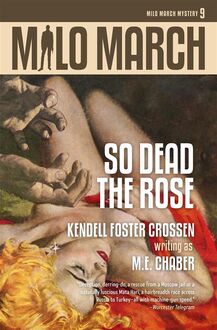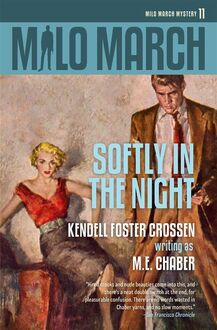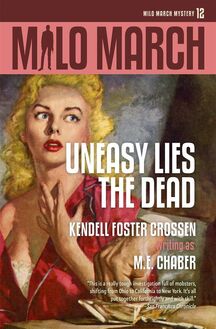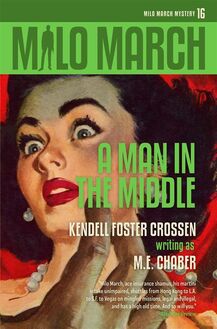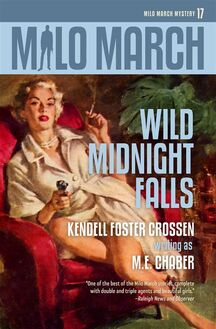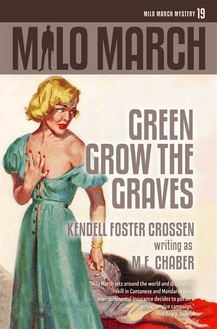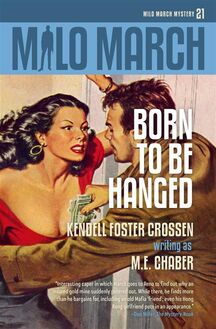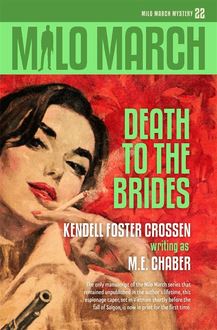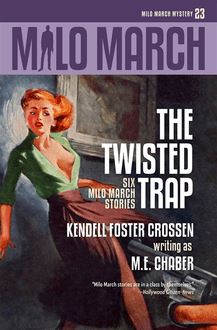Milo March #21 , livre ebook
99
pages
English
Ebooks
2021
Vous pourrez modifier la taille du texte de cet ouvrage
Obtenez un accès à la bibliothèque pour le consulter en ligne En savoir plus
Découvre YouScribe en t'inscrivant gratuitement
Découvre YouScribe en t'inscrivant gratuitement
99
pages
English
Ebooks
2021
Vous pourrez modifier la taille du texte de cet ouvrage
Obtenez un accès à la bibliothèque pour le consulter en ligne En savoir plus
Publié par
Date de parution
10 mai 2021
Nombre de lectures
2
EAN13
9791220802437
Langue
English
You guessed it—a few months later the owners claim the mine has run dry, and they want their payout. The insurance company screams at once for its top investigator, Milo March.
Milo first has to solve a riddle: How do you get gold out of a mine that has no gold in it? The easy explanation is the old con job known as salting, but that only involves a sprinkling of gold around a mine to deceive buyers. This mine had a helluva lot more gold than that. So the answer to the riddle must be that you bring gold into the mine, then take it out again.
Now this raises another question: Where did they get a ton of gold bricks to put into the mine? One of the owners of the mine belongs to a crime family that Milo has tangled with before. The Syndicate must be using the mine as a front for something else. Milo can’t imagine its being a front for anything except gold.
That sounds silly. But the case is anything but silly, turning deadly as Milo gradually unravels its complexities. Though it’s a case for the FBI, Milo wraps it up in his own way, determined to set things right for an innocent victim whose friendship has come to mean a lot to him.
Publié par
Date de parution
10 mai 2021
Nombre de lectures
2
EAN13
9791220802437
Langue
English
Born to Be Hanged
by
Kendell Foster Crossen
Writing as M.E. Chaber
Steeger Books / 2021
Copyright Information
Published by Steeger Books
Visit steegerbooks.com for more books like this.
©2001, 2021 by Kendra Crossen Burroughs
The unabridged novel has been edited by Kendra Crossen Burroughs.
First Paperback Edition
All rights reserved. No part of this book may be reproduced or utilized in any form or by any means, electronic or mechanical, without permission in writing from the publisher. The scanning, uploading, and distribution of this book via the Internet or via any other means without the permission of the publisher is illegal and punishable by law.
Publishing History
Hardcover
New York: Holt, Rinehart & Winston (A Rinehart Suspense Novel), August 1973. Dust jacket by Jay Smith.
Toronto: Holt, Rinehart & Winston of Canada, August 1973.
Roslyn, NY: Detective Book Club #379, Walter J. Black, Inc., November 1973. (With Reckless Lady by Rae Foley and Conquest before Autumn by Matthew Eden.)
Dedication
For Marcelia
She walks in the early morning like a rose
Lifting its petals to greet the dawn,
Each petal the warm ruby of a midnight kiss,
Lifting eagerly for the caress of the golden fingers
Reaching from the soft blue backdrop of the day.
Looking upward and beyond, before they meet,
She says good-bye to the last lingering star.
—Stefan Krosno
One
The rays of the sun reached through the office windows and covered the walls with yellow finger painting. But it was the only thing to enter the office. Every morning had been like that for a month. I was tired of it. I had finished reading the morning paper, including the reports of baseball spring training. I opened a desk drawer and took out a bottle of brandy. I poured a small drink and sipped it. I was thinking of going out, locking the door, and doing something exciting—like taking a walk in Central Park.
The phone rang. I picked up the receiver. “March’s Agency,” I said. That’s me. I’m Milo March. I’m also the agency.
“Milo, boy, how are you?” It was Martin Raymond. He’s a vice-president of Intercontinental Insurance, the company I do most of my work for. I was about to tell him that I wasn’t sure I was up to visiting a rarefied atmosphere so early in the morning, but then I remembered that he’s the one that hands out all of those jobs. Every time he calls me, I hear the counting of money. It always sounds like crisp lettuce.
“I haven’t checked with my doctor yet,” I said. “I’ve been sitting here counting the minutes and wondering if I would ever again hear the sound of a friendly voice—and then you called. I must be a … is it psychic or psycho? I can never remember.”
Martin Raymond was never sure how he was supposed to react, but he dutifully made a noise that sounded more like a whinny than a laugh. I had to at least give him credit for trying.
“Are you busy?” he asked.
“That’s a good question,” I said. “I was sitting here wondering whether I should go on being busy or take a nice walk in Central Park. They tell me that’s where the action is.”
This time he didn’t even try to laugh. That was a sign that he was about to get down to business. “I think we might have a small job for you,” he said. That meant that he was hoping I wouldn’t take too many days on it because I cost three hundred dollars for each day. Plus expenses.
“If it’s that small,” I said, “why don’t you turn it over to one of the office boys? Give him a fat expense account, and I’ll give him the name and address of a good bar. All he has to do is mention my name and he can get dry martinis for a dollar and a half a clip. That should result in an imaginative report. A little editing and you could probably submit it for a Pulitzer Prize. In fiction.”
“We tried that once with one of your expense accounts, but they said that it was too amateurish.” He sounded pleased with what he considered a bit of humor.
“Please,” I said with a pained sound. “I’m supposed to make the jokes around here. Besides, if you think my expense accounts are amateurish, I don’t want to hear any more complaints about them being padded.”
That was supposed to be a mortal blow, but he ignored it. “If you’re not too busy,” he said, returning to the friendly-but-executive level, “why not drop in and we’ll run over the case?”
“I forgot to bring my parachute,” I said, “but I’ll stroll up and see you. Maybe we can run it up a flagpole and see whose anthem is played first.” On that cheerful note, I hung up.
I lit a cigarette and finished my small drink. Then I shrugged into my jacket and left. It was a short walk up Madison Avenue to the concrete-and-glass building which stood as a monument to the enforced generosity of the policyholders of Intercontinental Insurance.
The executive offices were high up in the building. It was from there that I was dispatched to various parts of the world to toil in the Intercontinental vineyards. I am their chief investigator, which means that if you try to cut corners in order to collect the face value of your insurance policy, I am supposed to uncover the corners. At the risk of life and limb. For three hundred dollars a day and expenses. This also explains why they take a negative attitude toward selling me a large amount of insurance.
I stepped out of the elevator into the reception room. I stopped to admire the girl who was busy at the desk. She was something to look at. She had long black hair, large black eyes, a smooth Latin complexion, and full pouting lips. The rest of her was just as lovely. Her accessories were ample enough to stop the traffic on any street. She walked like a miracle on the way to happening.
Her name was Carmen O’Brien, the result of an Irish father and a Latin American mother. I had taken her to dinner several times, and she was always fun to be with. I had only one complaint. She had a roommate who was always there reading a book whenever I took Carmen home. It was enough to make a man lose his faith in American apple pie.
I walked over to the desk. She looked up just as I reached it. Her smile was like the first glimpse of the morning sun.
“Hello, Milo,” she said.
“Hello,” I answered. “I know I’ve seen you somewhere before. Now, let me think.”
She laughed. “Do you want to see Mr. Raymond?”
“I don’t want to. I am forced to by circumstances beyond my control. Namely, my bank account.”
She picked up her phone and dialed three numbers. She said my name, waited, and hung up. “Go right in,” she said. That meant Martin Raymond had already told his secretary to have me come in as soon as I arrived.
I went through a door. I started walking down the long strip of thick carpeting that led to his office. I always thought of it as the Last Mile.
His secretary looked up as I reached her desk. “Well, if it isn’t the boy wonder himself. He said to send you right in. His voice sounded like an alert signal, so I went down and told the cashier to lock her cage until further notice.”
“If I’m questioned about it,” I said, “I’ll say that I always spend half of my expense money on you.”
“I’ll bet you would. You’d better go on in. He’s being nervous today.”
“What’s up?” I asked.
“I don’t know. But I believe he’s been thinking all morning. I’ve even heard him pacing several times.”
“That is bad. I hope he hasn’t done too much thinking. He’s not built for it. He’s liable to be incoherent by the time I reach him. See you on the way out, honey.”
I walked past her and opened the door. He was sitting at his desk, his fingers drumming on the blotter. He looked up as I closed the door behind me.
“There you are,” he said, sounding like a man who had just discovered that the sun rises every morning. He waved across the room. “Help yourself to a drink. You know where the bar is.”
“I thought you’d never ask,” I murmured. I walked over to an antique cabinet. It probably had once been very valuable, but he’d had it changed so that it was now a complete bar. I poured myself a healthy drink of bourbon, dropped in a couple of ice cubes, and then crossed to a chair beside his desk.
“I take it,” I said, “that some vulgarian has dipped his unclean hand into the family till?”
“Two million dollars,” he said grimly.
“That’s grand larceny,” I said.
“Fraud,” he said. “Barefaced fraud. They’ll never get away with it. We’ll stop them in their tracks.”
“We?” I asked. “I think I just felt an angel tap me on my shoulder.”
He lifted his head and stared at me as if seeing me for the first time. “Milo, my boy, you’re just the man for the job.”
“That was a fast promotion from boy to man,” I said gently. “Are you going to tell me about the case, or do I have to guess?”
“What?” he asked. Then his expression changed as he got the message. “Yes. Of course.” He cleared his throat. “Did you ever hear of Reno, Nevada?”
“I seem to remember such a place,” I said dryly. “The Biggest Little City in the World. I think that’s what it’s called. What have you been doing, insuring a bunch of casino players?”
“This is no time for jokes,” he said seriously. “About six months ago we issued a policy for two million dollars on a gold mine not far from Reno.”
“Two million dollars on an old abandoned gold mine? You must have had gold dust in your eyes.”
“Not at all,” he said with dignity. “We had it completely checked out.”
“Of course,” I said. “Then it just happened to go dry within six months. Or maybe they had a hot, dry spell and all the pretty gold just melted and ran away. I’ve heard of Renoites who bragged about the local water, but
